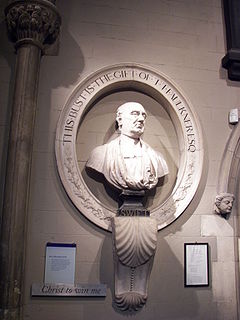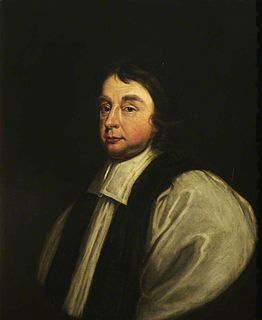
The Dean of St Patrick's Cathedral is the senior cleric of the Protestant St Patrick's Cathedral, Dublin, elected by the chapter of the cathedral. The office was created in 1219 or 1220, by one of several charters granted to the cathedral by Archbishop Henry de Loundres between 1218 and 1220.

John Lake was a 17th-century Bishop of Sodor and Man, Bishop of Bristol and Bishop of Chichester in the British Isles.

Thomas White (1628–1698) was Bishop of Peterborough from 1685 to 1690.
Robert Lougher was a Welsh clergyman, lawyer and politician who sat in the House of Commons in 1572. He was twice Principal of New Inn Hall, Oxford.
John Cotterell DCL was an English clergyman and academic at the University of Oxford, who was one of the founding fellows of Jesus College, Oxford.
George Wilkins, D.D. (1785-1865) served as a priest in the Church of England and was Archdeacon of Nottingham.
Henry Cole was an English Roman Catholic churchman and academic.
Meredith Hanmer (1543–1604) was a Welsh clergyman, known as a controversialist, historian, and translator. He was considered embittered, by the Lord-Deputy William Russell, 1st Baron Russell of Thornhaugh; but he appears now as a shrewd observer of the Protestant and nonconformist life of Ireland as founded around Trinity College, Dublin.
William Goodwin was an English churchman and academic, Dean of Christ Church, Oxford from 1611.
William Warham was a late-medieval English ecclesiastical administrator who was Archdeacon of Canterbury from c. 1505 to 1532 during the archiepiscopate of his uncle William Warham, Archbishop of Canterbury.
Martin Culpepper was an English clergyman, medical doctor, and academic at the University of Oxford.
John Pollard was a 16th-century Archdeacon of Wiltshire, Archdeacon of Cornwall, Archdeacon of Barnstaple and Archdeacon of Totnes.
James Calfhill (1530?–1570) was an Anglican priest, academic and controversialist, who died as Archdeacon of Colchester and Bishop-designate of Worcester.
The Ven. Dennis Ede was a British clergyman who served as Archdeacon of Stoke 1990 to 1997.
The Venerable William Robinson DD was Archdeacon of Nottingham.
John Fulham M.A. (1699–1777) was an English cleric, Canon of Windsor from 1750 to 1777 and Archdeacon of Llandaff from 1749 to 1777
John Copcot, DD was an English cleric and academic, becoming Vice-Chancellor of the University of Cambridge and Master of Corpus Christi College, Cambridge.
Harold Bryant Salmon (1891-1965) was a British Church of England priest, most notably Archdeacon of Wells from 1951 to 1962.
Richard Barber DCL was an English priest in 16th-century.
Scawen Kenrick was an English clergyman who served as Chaplain to the Speaker of the House of Commons and Archdeacon of Westminster.